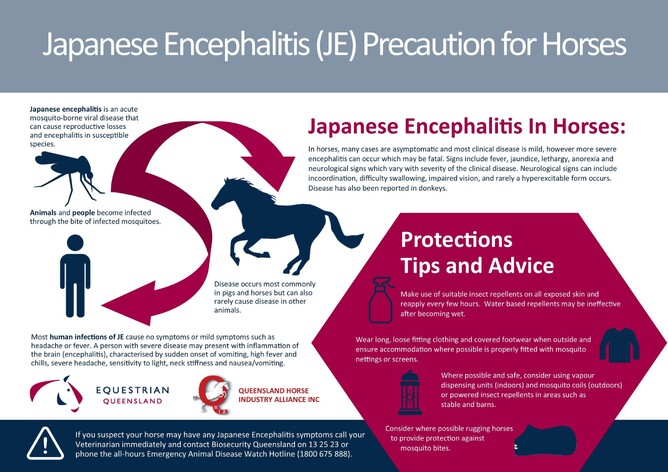Japanese Encephalitis is endemic throughout SE Asia but in Australia, usually found only in northern Queensland (Torres Strait) and potentially due to wet summer conditions, Japanese Encephalitis (JE) has been detected in piggeries in NSW, southern Queensland and northern Victoria. JE is transmissible to horses and humans, via certain genus of mosquito. While chronic illness from infection is rare, the disease is potentially fatal and is therefore a concern. Australia’s southern shift of detected JE has introduced the disease as a risk to horse breeding and racing. Where endemic, the disease can be managed by vaccination (horse or human), and this measure may be being undertaken in more widespread areas of Australia in response to the threat.
For NZ , concerning trade and transport of horses, the NZ Equine Health Association (NZEHA) and MPI have (under their Government Industry Agreement for biosecurity) is considering the risks and response measures. MPI considers that the likelihood of the disease entering NZ from an infected horse remains negligible. The equine health risks to NZ if a horse was imported with JE are considered nil, as:
Horses (and humans) are a ‘dead-end’ host meaning mosquitos cannot acquire the virus from horses or humans; and
There are no known confirmed mosquito species in NZ that are competent vectors of JE however we do have mosquitos of the same Genus.
However, were JE to be detected in NZ, there are potential negative trade implications, as under the OIE (World Organisation for Animal Health) if JE were detected in an imported horse, the NZ may lose its Country Freedom Status for this virus for a period, thereby adding additional pre-export vaccination or other pre-export costs for horse exporters until Country Freedom Status was reconfirmed. NZ could choose to put a hold on import of horses from Australia to avoid this risk, but MPI and NZEHA recognise that valuable export trade would be vastly curtailed by the absence of inbound airfreight stalls and Transport Grooms (or at the very least hugely increase the costs to NZ exporters). Another point not noted by MPI but worth considering is that NZ racehorses travelling to Sydney or Queensland carnivals would be restricted to a one-way ticket.
Thus on a measured and practical basis, MPI and NZEHA have jointly considered that the economic consequences from clinical cases of JE in horses in NZ would be low to industry, compared to the high economic consequences (halt of exports) of stopping trade with Australia even for a short period, and compared with the cost/impracticalities of pre-export isolation or Australia’s current inability to complete a vaccination schedule in a timely manner for Australian horses consigned to NZ.
Therefore, the agreed management option is that horse imports from Australia will continue, and that persons in charge of imported horses must observe imported horses for clinical signs of JE for at least 21 days post import. This requirement will be notified to vets via the equine branch of the NZVA and to consignees via the transport company (NZB Airfreight, IRT etc.)


